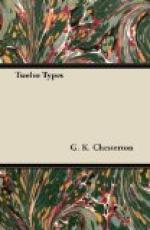Carlyle was, as we have suggested, a mystic, and mysticism was with him, as with all its genuine professors, only a transcendent form of common-sense. Mysticism and common-sense alike consist in a sense of the dominance of certain truths and tendencies which cannot be formally demonstrated or even formally named. Mysticism and common-sense are alike appeals to realities that we all know to be real, but which have no place in argument except as postulates. Carlyle’s work did consist in breaking through formulas, old and new, to these old and silent and ironical sanities. Philosophers might abolish kings a hundred times over, he maintained, they could not alter the fact that every man and woman does choose a king and repudiate all the pride of citizenship for the exultation of humility. If inequality of this kind was a weakness, it was a weakness bound up with the very strength of the universe. About hero worship, indeed, few critics have done the smallest justice to Carlyle. Misled by those hasty and choleric passages in which he sometimes expressed a preference for mere violence, passages which were a great deal more connected with his temperament than with his philosophy, they have finally imbibed the notion that Carlyle’s theory of hero worship was a theory of terrified submission to stern and arrogant men. As a matter of fact, Carlyle is really inhumane about some questions, but he is never inhumane about hero worship. His view is not that human nature is so vulgar and silly a thing that it must be guided and driven; it is, on the contrary, that human nature is so chivalrous and fundamentally magnanimous a thing that even the meanest have it in them to love a leader more than themselves, and to prefer loyalty to rebellion. When he speaks of this trait in human nature Carlyle’s tone invariably softens. We feel that for the moment he is kindled with admiration of mankind, and almost reaches the verge of Christianity. Whatever else was acid and captious about Carlyle’s utterances, his hero worship was not only humane, it was almost optimistic. He admired great men primarily, and perhaps correctly, because he thought that they were more human than other men. The evil side of the influence of Carlyle and his religion of hero worship did not consist in the emotional worship of valour and success; that was a part of him, as, indeed, it is a part of all healthy children. Where Carlyle really did harm was in the fact that he, more than any modern man, is responsible for the increase of that modern habit of what is vulgarly called ‘Going the whole hog.’ Often in matters of passion and conquest it is a singularly hoggish hog. This remarkable modern craze for making one’s philosophy, religion, politics, and temper all of a piece, of seeking in all incidents for opportunities to assert and reassert some favourite mental attitude, is a thing which existed comparatively little in other centuries. Solomon and Horace, Petrarch and Shakespeare were pessimists when they




